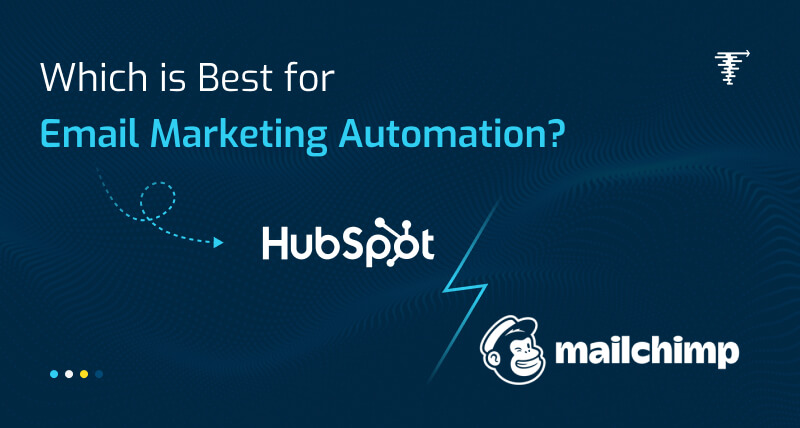

Engaging potential customers overwhelms companies and stresses maximizing marketing campaigns. Perhaps the biggest challenge is still sending personalised messages and emails at scale without getting disconnected from prospects. This is where email marketing automation has transformed the game. It enables brands to send personalised messages and emails on time, helping them nurture and drive conversions.
According to campaign monitor research, automated emails generate 70.5% higher open rates and 152% higher click-through rates than standard marketing messages. This figure's staggering growth highlights the importance of automating emails for even a large customer base. This is where HubSpot and MailChimp come into play. Both are robust platforms with powerful automation capabilities as per business requirements and budget.
But, which platform has the amalgamation of ease, features, capabilities, and ROI? Don't worry this post will aid you in identifying the best solution for your marketing and operational challenges. Let's get started!
Email automation changes static email campaigns into smart, behaviour-based emails that connect with customers at the correct time. It's a methodical approach that employs software, a platform, or a powerful CRM such as HubSpot and MailChimp to send trigger emails based on predetermined triggers, timelines, and customer behaviours.
This is one of the best email automation platforms, which gives a smooth path from lead capture to conversion. When a visitor subscribes to your newsletter, they automatically get a welcome series. If they view products but do not make a purchase, the system triggers targeted abandonment reminders.
Common Automation Triggers:
The power of automation lies in its ability to nurture leads without constant manual intervention. A B2B software company might set up a sequence that educates prospects about their product, shares case studies, and offers a demo - all triggered by the prospect's engagement level. This systematic approach delivers measurable benefits:
Being an all-in one CRM and integrated inbound marketing provider, HubSpot allows businesses to unlock advanced automation capabilities. This rich CRM provides effective email marketing capabilities, where businesses can monitor customer interactions from multiple channels. You are also able to build rich customer profiles, automate sophisticated marketing functions, and provide detailed analytics in order to enhance data-driven decision-making.
Mailchimp has evolved from just being an email service provider to an easy-to-use marketing platform. It's simple drag-and-drop interface makes it accessible to businesses of all technical capabilities. Due to its low price for offering exceptional capabilities, it is considered as one of the best email marketing platforms for small businesses.

Both HubSpot and Mailchimp are well-known platforms for email marketing automation. HubSpot offers a comprehensive suite of tools that go beyond just email marketing, including CRM, content management, social media management, and more beyond the basics. It offers AI-centric suggestions, scheduling posts, to tailored messages. On the other hand, Mailchimp, an email marketing service tool, offers a user-friendly interface with easy-to-use templates and automation features.
Related Blog: Future of Marketing Automation
a) Business Size Compatibility
HubSpot
HubSpot's robust features suit small startups to mid-size businesses with comprehensive marketing needs, complex sales cycles, large marketing teams, and multiple customer touchpoints. Along with sending personalised bulk emails to create and run a successful email marketing campaign, HubSpot has won this game.
Mailchimp
Mailchimp's streamlined approach serves smaller or startup e-commerce businesses with simple marketing needs. Since it offers basic email marketing services, limiting itself to catering to small business needs.
b) Integration Ecosystem and All-in-One Approach
HubSpot
HubSpot's all-in-one approach combines email marketing automation with CRM, content management, and social media management tools. This comprehensive suite of features enables businesses to manage their entire marketing ecosystem from a single platform.
Mailchimp
Mailchimp's strength lies in its user-friendly interface and ease of use, making it a popular choice for beginners or small businesses with simpler marketing needs.
c) Advanced Personalisation and Behavioural Tracking
HubSpot
HubSpot leverages its robust CRM capabilities to deliver advanced personalisation. By tracking customer behaviour, preferences, and lifecycle stages, it enables businesses to create highly targeted and personalised email campaigns.
Mailchimp
Mailchimp also offers personalisation options, allowing businesses to tailor content based on customer attributes, but it lacks the depth of personalisation and behavioural tracking capabilities offered by HubSpot.
d) Robust Automation Workflows and Lead Nurturing
Both HubSpot and Mailchimp offer automation workflows to streamline email campaigns.
HubSpot
Being one of the best email marketing platforms, HubSpot's automation workflows are highly customisable and enable businesses to create complex sequences of actions based on customer behaviour and specific triggers.
Mailchimp
Mailchimp provides a more straightforward automation workflow system, which may be suitable for businesses with less intricate automation needs.
e) Comprehensive Analytics and Reporting

HubSpot
HubSpot's analytics and reporting capabilities provide in-depth insights into email campaign performance, customer engagement, and conversion rates. Its advanced analytics features allow businesses to track and optimise their email marketing efforts effectively. Beyond this basic, HubSpot email marketing enables businesses to perform advanced A/B testing, Revenue attribution tracking, custom reporting dashboards, and predictive analytics. This provides a more comprehensive understanding of campaign performance, allowing businesses to make data-driven decisions and continuously improve their strategies.
Read Also: Latest Marketing Automation Trends
Mailchimp
Mailchimp offers essential reporting metrics that enable businesses to track basic email performance metrics, click maps, and simple A/B testing options to measure key metrics such as open rates and click-through rates. This information allows businesses to make data-informed decisions and optimise their email marketing strategies.
f) Seamless Integration and Collaboration
HubSpot
HubSpot offers a native CRM with deep sales pipeline integration options to enhance its functionality by connecting with other business tools and systems. It integrates with popular CRM systems like Salesforce, Zoho CRM, and Microsoft Dynamics, enabling businesses to sync contact and lead data, track sales activities, and align marketing and sales efforts.
It also integrates with e-commerce platforms like Shopify, WooCommerce, and Magento, allowing businesses to sync customer and order data, personalize marketing campaigns, and optimize customer experiences.
Moreover, it integrates with email marketing tools such as Mailchimp and Campaign Monitor, social media platforms like Facebook and LinkedIn, and content management systems like WordPress and Drupal.
Additionally, HubSpot offers integrations with analytics and reporting tools like Google Analytics and Google Data Studio, enabling businesses to track marketing performance, generate customized reports, and gain valuable insights. These options empower businesses to leverage
Furthermore, HubSpot's integration capabilities allow businesses to connect with other key systems and platforms, such as customer support software, e-commerce platforms, and analytics tools, to streamline operations and gain a holistic view of their customers. Whether it's expanding into new markets, increasing customer acquisition, or improving customer retention, HubSpot provides the necessary tools and support for businesses to achieve their growth objectives.
Mailchimp
MailChimp's email marketing service offers basic contact management with limited sales features. It integrates seamlessly with popular e-commerce platforms such as Shopify, WooCommerce, Magento, and BigCommerce.
Mailchimp also integrates with content management systems (CMS) like WordPress, making it easy to manage and distribute content to engage and nurture leads.
Moreover, Mailchimp's integrations with CRM platforms such as Salesforce and Zoho CRM facilitate streamlined data synchronization, ensuring a cohesive customer experience across all touchpoints.
While Mailchimp also offers integration options, HubSpot's extensive integration capabilities provide businesses with a more unified and streamlined marketing experience.
g) Scalability and Growth Potential

HubSpot
By utilising HubSpot's comprehensive suite of CRM and marketing automation services, businesses can unlock advanced features needed to expand their operations and drive sustainable growth. It allows businesses to create personalised and targeted email marketing campaigns to engage their audience at every stage of the buyer's journey, increasing conversion rates and driving revenue growth.
Mailchimp
Mailchimp offers a free plan that allows businesses to get started with email marketing automation at no cost. This advantage makes it an attractive option for businesses with limited marketing budgets or those looking to test the waters before committing to a paid platform. While suitable for smaller businesses with simpler marketing needs, Mailchimp may not provide the same scalability and comprehensive suite of tools to support long-term growth and evolving marketing requirements.
| Feature | Details |
| Who Should Attend | Marketing, Sales, Operations, or HR managers |
| Date & Time | 8th May 2025, 3:30 PM – 4:30 PM IST |
| Cost | Free |
| Platform Highlighted | monday.com |
| Key Benefits | Manage all work in one place, accelerate execution, keep teams aligned |
| What You’ll Learn | Organize workstreams, automate tasks, improve delivery speed and accountability |
| Focus Areas | AI and automation in work management for structure, speed, and streamlined workflows |
Mailchimp or HubSpot is selected based on your specific business needs and growth strategy. HubSpot suits big businesses, companies with intricate sales processes, organizations that require in-depth CRM integration, and companies that are ready to invest in overall marketing software, whereas Mailchimp suits small to medium businesses, online shop businesses, teams that require simple setup, and budgeted businesses. The best method for making a decision is to trial both platforms-HubSpot provides a 14-day free trial of their professional features, and Mailchimp has a free plan to test their core features-so you can see how the user interface feels, look at automation capabilities, investigate integration options, estimate team adoption needs, and project long-term ROI potential. Your choice must be in proportion to your short-term needs and future development, so consider issues like employees' size, technical competency, and scalability needs when making your choice.
Streamline your Business Operations With the Right email Marketing Automation. Connect Us
The decision between HubSpot and Mailchimp will entirely depend on your business needs. HubSpot is an excellent email marketing automation tool, suitable for intricate automation workflows, powerful CRM integration, and complete marketing tools. Mailchimp is perfect for simplicity and affordable solutions for small businesses.
Mailchimp offers a free plan, which can have up to 500 subscribers, and basic automation. You need to pay $13 per month for other plans. The plans of HubSpot start at $20/month for the Starter plan but feature advanced automation, CRM tools, sales tools, and marketing analytics.
Yes you can, but cross-platform migration requires planning. HubSpot provides migration support through native import tools, professional services team, and certified partners for big-scale migrations.
Email automation services drive business growth through personalised customer experiences, effective use of time in marketing activities, scalable communication plans, and data-informed decision-making.